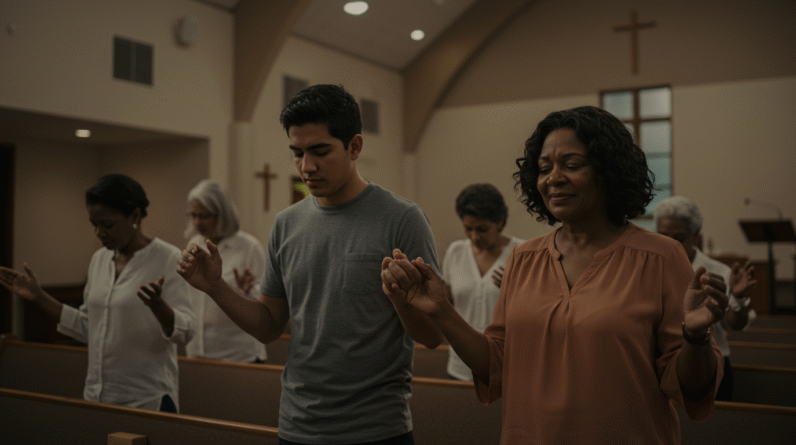Your Role In The Body Of Christ
You already know the church isn’t a building — it’s a living, breathing community of people. Yet sometimes you might feel small, unsure of where you fit, or hesitant to step up. This article is written for you: to help you recognize your Role in the Church, to encourage you to discover and exercise your spiritual gifts, and to show how your everyday choices matter for the health of the Body of Christ. As you read, you’ll find scripture-based encouragement, practical steps, and a gentle push to get involved where you live.
Understanding the Body of Christ: A Biblical Foundation
When Scripture describes the church as a body, it’s not a poetic image only — it’s direction for how you should live and serve. The apostle Paul lays out this metaphor clearly, showing that every part matters and that diversity is integral to unity. That means your gifts, personality, and experiences are not random: they’re part of God’s design for the whole. Read this foundational passage and let it shape how you think about your Role in the Church: 1 Corinthians 12:12-27.
What the Body Metaphor Means for You
You are both unique and connected. The body image implies interdependence: what benefits one part benefits all, and what harms one part affects the whole. This should change how you view service, leadership, and belonging. You’re not only called to show up; you’re called to contribute according to God’s design so the whole community thrives. Keep the focus keyword in mind: your Role in the Church is both personal and communal — a responsibility and a gift.
Discovering Your Spiritual Gifts
God equips you to serve. Spiritual gifts aren’t just for pastors or a spiritual elite; they’re given to ordinary people for ordinary contexts — to build up the church. Paul lists different gifts and urges gratitude and responsible use. These gifts help clarify your Role in the Church and direct where your energy and passion will bear fruit. For the gift lists and teaching, read: Romans 12:4-8 and 1 Peter 4:10-11.
How to Identify Your Gifts
You might wonder, How do I actually discover what I’m good at spiritually? Start with prayer and self-reflection. Ask God to show you where you feel most alive, where others affirm you, and where the church struggles without you. Try serving in different ministry areas for a season. Talk with mature believers and leaders who can observe your strengths. You can also use reputable spiritual gifts inventories as tools, but don’t treat tests as the final word. The process helps clarify your Role in the Church and often leads to a clearer sense of vocation within your local congregation.
The Importance of Serving Locally
Your Role in the Church is most often played out locally. While global missions and online ministries are vital, the local church is where relationships form, discipleship happens, and repeated acts of service shape character. Meeting together, encouraging one another, and being present for the ordinary rhythms of church life matter deeply. Scripture highlights this: make gathering and serving together a priority — see Hebrews 10:24-25 and the call to make disciples in Matthew 28:19-20.
Serving Isn’t Optional
Sometimes you might think service is for “other people.” But the New Testament assumes active involvement from all believers. Leaders are given to equip the saints so the whole body is built up; that work requires participation. Ephesians teaches that gifts are intended so the church grows in unity and maturity — this is the practical outworking of your Role in the Church: Ephesians 4:11-13.
Practical Ways to Serve in Your Local Church
Serving can look like many things. If you’re wondering where to start, consider these options and test a few out. Remember that small, faithful tasks done consistently shape the church more than sporadic grand gestures.
- Helping with children’s ministry, youth groups, or Sunday programs
- Greeting newcomers, ushering, or serving coffee to build community
- Joining a worship team, tech team, or creative ministry
- Participating in a small group as host, leader, or member
- Using professional skills (accounting, counseling, teaching) for church needs
Each of these choices reflects your Role in the Church. Choose one or two, commit for a season, and evaluate how they align with your gifts and calling. Serving in practical ways is a spiritual discipline that stretches you and blesses others.
Using Your Gifts in Everyday Life
Your Role in the Church isn’t confined to Sunday. How you parent, do your job, treat neighbors, and use your resources are all arenas of service. When you apply your gifts at work, at home, and in your neighborhood, you extend the ministry of the church into everyday life. Galatians encourages you to serve one another in love; that’s a daily reminder of your Role in the Church: Galatians 5:13.
Overcoming Barriers to Serving
There are real barriers you might face: fear of failure, comparison, perfectionism, busyness, or feeling unqualified. These obstacles can keep you from living fully into your Role in the Church. But Scripture gives both counsel and comfort. You are reminded to act in humility and love, to serve without selfish ambition, and to rely on God’s strength rather than your own: Philippians 2:3-4.
Handling Fear, Comparison, and Busyness
If fear holds you back, remember Jesus often sends his followers with promises of presence and power. If comparison distracts you, choose to celebrate diversity in gifts rather than measure worth by public visibility. If busyness dominates your life, practice Sabbath rhythms and evaluate what you can release so you can serve well. Practical boundaries and spiritual habits help you keep your Role in the Church healthy and sustainable.
Dealing with Conflict and Imperfection
Churches are made of imperfect people, so conflict is inevitable. How you handle disagreements often says more about your maturity than how gifted you are. Scripture calls you to clothe yourself in compassion, kindness, humility, gentleness, and patience, bearing with one another in love. This fosters unity and prevents small issues from fracturing your Role in the Church: Colossians 3:12-14.
Practicing Reconciliation
When conflict arises, pursue reconciliation with prayer, truth, and grace. Speak the truth in love, listen well, and seek wise counsel. You’re helping the church represent Christ by prioritizing restoration over victory. This attitude shifts the community from superficial peace to deep health, and it shapes every person’s Role in the Church.
Leadership and Lay Ministry
Not everyone is called to formal leadership, but every believer can exercise leadership in various contexts. Leadership in the New Testament is framed as service, not domination. Leaders equip the saints and model Christlikeness. If you’re in a leadership role, remember that your influence should point people toward maturity and mission. For teaching about leaders equipping the church, read: Ephesians 4:11-16.
Mentorship and Discipleship
Part of your Role in the Church is investing in others. Discipleship may look like mentoring a younger believer, leading a small group, or simply living transparently so others learn how to follow Jesus. Paul’s instruction to older and younger believers to live out their faith intentionally gives a model for intergenerational ministry. Consider passages like Titus 2:3-8 as guides for how to mentor and be mentored.

The Mission of the Church and Your Participation
Your Role in the Church isn’t only inward-facing; it’s missional. The church is sent into the world to make disciples, serve the poor, and proclaim the good news. Your local congregation is a primary platform for that mission, and your gifts will help the church reach beyond its walls. The Great Commission frames this active calling: Matthew 28:19-20. As you serve locally, you’re participating in God’s global purpose.
Connecting Service and Witness
When you serve, you demonstrate the gospel in real, tangible ways. Hospitality, justice work, teaching, counseling, and mercy ministries all communicate God’s love. Your Role in the Church is therefore both service and testimony. Remember that your actions often say as much about Jesus as your words do. John’s words on abiding in Christ and bearing fruit remind you of the joy that comes from faithful witness: John 15:5-11.
Spiritual Formation: How Serving Shapes You
Serving changes you. It refines character, builds humility, and deepens reliance on the Spirit. When you take on a role in the church, it’s not merely about activity; it’s about transformation. Your Role in the Church is a context for sanctification — becoming more like Christ through practical obedience and community life. Paul’s vision of maturity shows how growth in service benefits everyone: Ephesians 4:13-16.
Discipline and Spiritual Practices
Serving well also requires spiritual disciplines: prayer, Scripture, worship, and the sacraments. These practices keep you rooted in God’s grace and guided by wisdom. Regular confession, accountability, and spiritual direction help you stay humble and faithful. The Scriptures encourage mutual encouragement and accountability as part of your Role in the Church: 1 Thessalonians 5:11.
The Joy and Reward of Serving
Serving isn’t drudgery when you understand its source and results. Jesus promised that abiding in him brings joy and that serving him produces lasting fruit. This is not a promise of comfort, but a promise of purpose and deep satisfaction. When you see lives changed because you used your gifts, you’ll experience the spiritual reward of faithful service and the joy of abiding in Christ: John 15:11.
Eternal Perspective
Your Role in the Church has eternal significance. The small acts of service you perform now are part of a larger, redemptive story. Scripture reassures you that God sees and will reward faithful stewardship. Keep an eternal perspective when tasks feel mundane or thankless — God is working through your obedience in ways you may never fully see.
Practical Plan: A 30-Day Serving Challenge
If you’re ready to move from passive to active in your Role in the Church, consider a 30-day challenge. Commit to a practical rhythm for one month and evaluate how it shapes you and your community.
Day 1–7: Pray daily for clarity about your gifts; attend a service and introduce yourself to a leader. Day 8–14: Volunteer in an area you’ve never tried (welcome team, childcare, hospitality). Day 15–21: Invite someone to coffee or a small group and practice intentional listening. Day 22–28: Lead a short devotional, help organize an event, or use a professional skill to serve. Day 29–30: Reflect, journal what God taught you, and commit to a regular role in the church.
This plan is flexible — adjust it to your season of life. The point is consistency and practical engagement that confirms and grows your Role in the Church.
Common Questions About Your Role in the Church
You might have specific concerns: What if I fail? What if my gift isn’t valued? What if I don’t fit the church culture? These are valid. The Bible answers with grace: God uses imperfect people and often grows them through trials. Don’t let fear of imperfection keep you from participating. Remember Paul’s teaching: use what you have for the benefit of all. For encouragement about using gifts for others, read: 1 Peter 4:10-11.
What About Those Who Aren’t Gifted Publicly?
Not all gifts are public or glamorous. Service in a behind-the-scenes role is equally vital. The Body needs hands that clean, voices that encourage quietly, and people who pray faithfully. Your Role in the Church might be unseen by many but deeply felt by those you serve. Jesus commended humble service; value the kingdom impact rather than public recognition.
Staying Committed Long-Term
Serving can be a marathon, not a sprint. To stay committed, build rhythms, find accountability, and continually return to why you serve. Connect your service to spiritual disciplines and a local community that cares for you. Leaders and churches should invest in volunteers, provide training, and encourage sustainable involvement so your Role in the Church can be life-giving rather than draining.
Asking for Feedback and Growth
Be open to feedback and opportunities for growth. Ask leaders for regular check-ins and be willing to adjust roles as God shapes you. Growth often requires humility and intentionality. If criticism comes, weigh it carefully and seek wise counsel. The goal is maturity and fruitfulness, not perfection — a healthy approach to your Role in the Church.
Resources to Help You Serve Better
There are many resources — books, online courses, church training sessions, and mentorship opportunities — that can help you develop your gifts. Consider studying Scripture passages about spiritual gifts and service, attending workshops offered by your church, and finding a mentor who models servant leadership. Practical theology and hands-on experience together refine your Role in the Church.
Final Encouragement: You Are Needed
You are a crucial part of the Body of Christ. Your gifts, presence, and faithfulness matter more than you might think. The church grows and mission advances when each person embraces their Role in the Church. Don’t wait for a perfect moment or for someone to invite you; take small steps of obedience, and trust the Spirit to guide and equip you.
Read one more passage as a benediction and reminder of the mutual encouragement and building up the Body requires: Hebrews 10:24-25. Then take one practical step today — introduce yourself to a ministry leader, sign up for a training, or simply offer to help with a specific need.
Explore More
For further reading and encouragement, check out these posts:
👉 7 Bible Verses About Faith in Hard Times
👉 Job’s Faith: What We Can Learn From His Trials
👉 How To Trust God When Everything Falls Apart
👉 Why God Allows Suffering – A Biblical Perspective
👉 Faith Over Fear: How To Stand Strong In Uncertain Seasons
👉 How To Encourage Someone Struggling With Their Faith
👉 5 Prayers for Strength When You’re Feeling Weak

📘 Jesus and the Woman Caught in Adultery – Grace and Mercy Over Judgement
A powerful retelling of John 8:1-11. This book brings to life the depth of forgiveness, mercy, and God’s unwavering love.
👉 Check it now on Amazon 🛒💥
🔥 “Every great message deserves a home online.” 🌍💬🏡
Don’t let your calling stay hidden. Start a Christian blog or website using Hostinger — with 99.9% uptime, a free domain, and SSL, your voice can shine for God’s glory anytime, anywhere.
💥 Begin today. 🛒 Try it RISK-FREE! ✅
✝️ “Your body is God’s temple — care for it with purpose.” 💪💖🏛️
Renew your energy and restore balance naturally. Mitolyn helps support a healthy metabolism, giving you the vitality to live out God’s calling with strength and confidence.
🔥 Unlock Your Metabolic Power! ⚡Burn More Calories & Feel Great With Mitolyn. 💪
👉 Start Today. 🚀 Check Price Now. 🛒💰
💰 As a ClickBank & Amazon Affiliate, I earn from qualifying purchases.
📖 Acknowledgment: All Bible verses referenced in this article were accessed via Bible Gateway (or Bible Hub).
🚀 Want to explore more? 👉 Dive into our new post on Why Jesus? and experience the 🔥 life-changing truth of the Gospel!






